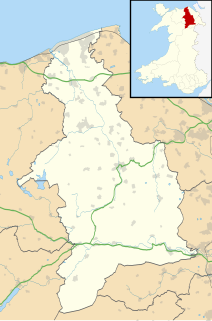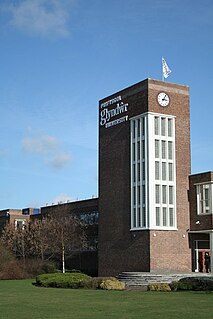Thomas Lloyd (c. 1673 – October 1734) was a Welsh cleric and lexicographer. He was the son of Thomas Lloyd, a lawyer from Wrexham and part of the Lloyd family of Llanfair Talhaearn, Denbighshire. He was educated at Jesus College, Oxford, matriculating on 25 February 1689 at the age of 15. He obtained a Bachelor of Arts degree in 1692 and his Master of Arts degree in 1695. He was ordained and was a curate in the Wrexham area, tutoring also at Chirk Castle. He was chaplain to Mary Myddelton of Croesnewydd, and lived at Plas Power which she owned. She bequeathed the property to him but he died before he inherited. He was buried in Wrexham on 22 October 1734. [1]

Wales is a country that is part of the United Kingdom and the island of Great Britain. It is bordered by England to the east, the Irish Sea to the north and west, and the Bristol Channel to the south. It had a population in 2011 of 3,063,456 and has a total area of 20,779 km2 (8,023 sq mi). Wales has over 1,680 miles (2,700 km) of coastline and is largely mountainous, with its higher peaks in the north and central areas, including Snowdon, its highest summit. The country lies within the north temperate zone and has a changeable, maritime climate.

Wrexham is the largest town in the north of Wales and an administrative, commercial, retail and educational centre. Wrexham is situated between the Welsh mountains and the lower Dee Valley alongside the border with England. Historically part of Denbighshire, the town became part of Clwyd in 1974 and since 1996 has been the centre of the Wrexham County Borough.

Denbighshire is a county in north-east Wales, named after the historic county of Denbighshire, but with substantially different borders. Denbighshire is the longest known inhabited part of Wales. Pontnewydd (Bontnewydd-Llanelwy) Palaeolithic site has Neanderthal remains from 225,000 years ago. Its several castles include Denbigh, Rhuddlan, Ruthin, Castell Dinas Bran and Bodelwyddan. St Asaph, one of the smallest cities in Britain, has one of the smallest Anglican cathedrals. Denbighshire has a length of coast to the north and hill ranges to the east, south and west. In the central part, the River Clwyd has created a broad fertile valley. It is primarily a rural county with little industry. Crops are grown in the Vale of Clwyd and cattle and sheep reared in the uplands. The coast attracts summer tourists, and hikers frequent the Clwydian Range, which forms an Area of Outstanding Natural Beauty with the upper Dee Valley. Llangollen hosts the Llangollen International Musical Eisteddfod in each July.
The National Library of Wales has copies of some of his books and manuscripts. These include his annotated copy of John Davies's Dictionarium Duplex, with additional words and citations, used by the University of Wales when compiling the University's Welsh dictionary. [1]

The National Library of Wales, Aberystwyth, is the national legal deposit library of Wales and is one of the Welsh Government sponsored bodies. It is the biggest library in Wales, holding over 6.5 million books and periodicals, and the largest collections of archives, portraits, maps and photographic images in Wales. The Library is also home to the national collection of Welsh manuscripts, the National Screen and Sound Archive of Wales, and the most comprehensive collection of paintings and topographical prints in Wales. As the primary research library and archive in Wales and one of the largest research libraries in the United Kingdom, the National Library is a member of Research Libraries UK (RLUK) and the Consortium of European Research Libraries (CERL).

Dr John Davies, Mallwyd was one of Wales's leading scholars of the late Renaissance. He wrote a Welsh grammar and dictionary. He was also a translator and editor and an ordained minister of the Church of England.

The University of Wales was a confederal university based in Cardiff, Wales, UK. Founded by Royal Charter in 1893 as a federal university with three constituent colleges – Aberystwyth, Bangor and Cardiff – the university was the first and oldest university in Wales, one of the four countries in the United Kingdom. The university was the second largest university in the UK.




